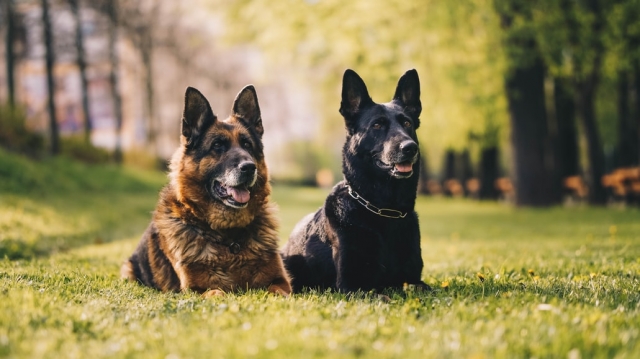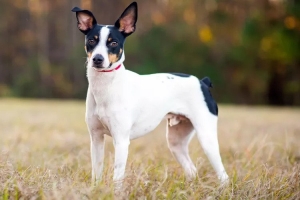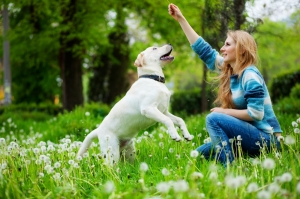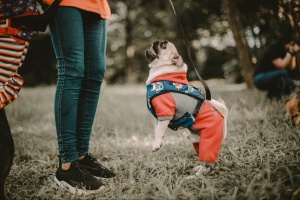They were known to detect narcotics, weapons, brush fires, missing persons, and even cancer. Now, dogs are learning to track down the virus.
What if dogs became "allies" in the chase for the virus? Normally, Eliot the dog tracks criminals or missing persons, but this Malinois shepherd has also been training to detect Covid thanks to the men's sweat, as part of a survey coordinated by the Bordeaux University Hospital.
The goal is to provide a "complementary solution" just when "we need an extended, rapid and non-invasive screening offer," underlines Thierry Pistone, a specialist at the University Hospital Center (CHU) of Bordeaux.
Same as Eliot, the Marvel Labrador, and three other Malinois and German shepherds, all members of dogs brigades of the gendarmerie and firefighters, have been training in Libourne, close to Bordeaux. In their new "game": detecting compresses of perspiration taken for 10 minutes under the armpits of people positive for COVID-19, at the beginning of infection.
This is how almost every day, sweat samples arrive from the University Hospital to be presented to the truffle of dogs trained at the training center set up by Ceva at its headquarters in Libourne. "They detect organic matter of degradation resulting from the infection," devoid of viral expression, specifies Dr. Pierre-Marie Borne, referent at Ceva.
At the signal "Au cone!" the dogs set to work. After Eskiss, a specialist in the detection of "narcotics," weapons, and ammunition, the Malinois Eliot, in turn, dips his muzzle into a row of metal cones.
Suddenly, he marks in front of two of these funnels, his tail wagging: at the interior, there are two different samples of sweat taken from positive patients.
A complementary solution to the tests
While the program moves forward, there is still a lot of work to be done to prove the effectiveness of the dogs. The study will continue for several months. But if successful, this tool could provide a real complementary solution to screening tests, according to Pierre-Marie Borne: "The idea behind it is to use dogs not to replace a reference test, but as a pre-selection to be able to better control. It could be when getting off a boat or an airplane, the dogs will mark the positive, which will allow the pre-selection, and then the test will control this positive. The pre-selection can also allow, first of all, to isolate positive people before they have the results of their reference test to prevent them from contaminating. It is up to the competent authorities to decide; the objective is to give all the elements".
Trained dogs detect 95% of positive cases
Called Cynocov, this project assisted by the Nouvelle-Aquitaine region (France) is based on the Nosaïs-Covid19 method developed by Pr Dominique Grandjean of the National Veterinary School of Maisons-Alfort, which improve the huge "olfactory library " of the dog, previously used for detecting some cancers.
"On average, dogs can detect 95% of positive cases for Covid-19", says Professor Grandjean. This method is notably tested in Corsica, and depending on the project leaders, "40 countries are working on this matter".
After six to eight weeks of training at the rate of four mornings per week, the ability of the dogs will still have to be demonstrated during a clinical study at the University Hospital before a possible use of the tool. Objective: to test their performance on various types of samples referring to different areas of the disease, i.e., their ability to detect serious or non-serious forms, contagious or less contagious, symptomatic and asymptomatic subjects, but also those affected with a variant.
The method would make it possible to make a pre-selection of "suspicious" cases
If practical, "the tool will mainly be used to pre-screen" suspicious people in order to "target confirmation screening needs" by the nasopharyngeal RT-PCR reference test, clarifies Dr. Pierre-Marie Borne at Ceva.
"When we know that, we will be able soon to have to screen people who are a priori asymptomatic in all kinds of spaces (schools, homes, airports, etc.). This type of tool, which provides at least a strong criterion of suspicion, will permit, in terms of acceptability and reactivity, to facilitate this process," estimates Professor Denis Malvy, chef of the contagious and tropical diseases department at the CHU.
For the doctor, also a member of the scientific council, these dogs are "almost our partner in the making of a screening tool which will have," he hopes, "its place in the need to manage this health emergency."






